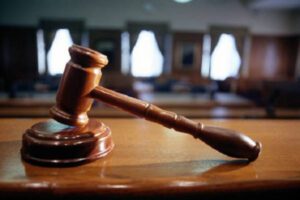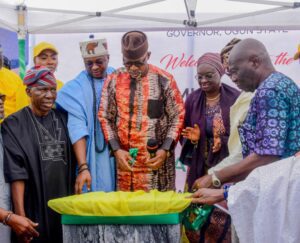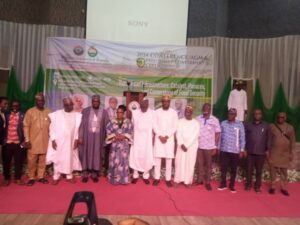
LASG moves to regulate access to groundwater to prevent land sinking, pollution
…looks into regulating borehole drilling, licencing of contractors
…Calls for collaboration for regulatory measures
By Moses Adeniyi
Lagos State Government (LASG) has begun the process to delve into regulation of access to underground water across the State – Nigerian NewsDirect has learnt.
The development, the State Government noted, was necessary to avert a catastrophic projection of subsidence which studies have identified Lagos as one among eight megacities in the world at the risk of sinking in the next three to five decades (30 to 50) years.
For proactive measures, the State Government in a study to access the environmental status, said it has found it necessary to commence in earnest regulations of borehole drilling, groundwater abstraction, consumption, supply and distribution, for robust groundwater resources management and sustainability.
Speaking on Tuesday, at the official Presentation of Hydrogeological Data Inventory Report of Lagos State in recognising groundwater resources management and sustainability in regulatory practices, the Executive Secretary, Lagos State Water Regulatory Commission, (LASWARCO) Mrs. Funke Adepoju, said “data mining of groundwater resources across the State requires immediate scientific assessment of its formation, accumulation and rate of its abstraction in the face of the rapid urban development in Lagos for environmental sustainability and policy formulation.”
According to her, one of the core functions of the Commission under the Lagos State Environmental Protection Law (2017) was to regulate and approve groundwater abstraction. consumption, supply and distribution in ensuring groundwater resources management and sustainability.
According to her, groundwater plays an important role as an alternative source of fresh water for the benefit of human survival “as provided by nature for domestic, industrial and agricultural use and also for sustaining the ecosystem.”
She observed that, if not regulated, “as a precious common resources”, groundwater as an alternative source of fresh water is under threat of geo-hazards as a result of lack of scientific data for proper management of the resources, over abstraction, climate change and possibly pollution.
She appreciated the Lagos State Governor, Mr. Babajide Sanwo-Olu for the approval of the study, which she said would further strengthen the Commission’s capacity to protect and ensure groundwater safety.
The study, she observed, would help to determine the geology of the water bearing layers, mapping of boreholes densities and demarcation of the various hydro geologic zones to effect groundwater regulations and sustainable management.
“Generated data will enable government project and delineate areas in the coastal zone prone to saline water intrusion and areas prone to leechate from dumpsters and can constantly issue advisory for water plan strategy,” she said.
The Technical Head, Hydrated Geo Consulting Services, Dr. Akomeno Oteri, in his presentation of the report, said it was important to follow world regulation standards of getting approval and license for not just digging boreholes, but also the volume of water that could be abstracted from these sources.
He said apart from saline water intrusion, over-abstraction can lead to land subsidence, observing that given that Lagos has been identified as one of eight megacities in the world that will sink in the next 30 to 50 years, the importance of regulation of groundwater resources is crucial.
“Saline water intrusion which occurs naturally can be exacerbated by uncontrolled drilling of boreholes and extraction of groundwater,” he said adding that “climate change will make saline water intrusion worse in the years to come except steps are taken to put in place groundwater management programme.”
Warning against the impacts of indiscriminate digging of boreholes and water extraction, he recommended that for effective groundwater management in Lagos, the State Government should strengthen “Licencing of Drilling Contractors; Borehole Registration and Monitoring; and Licencing of abstraction in boreholes.”
Also, he recommended, declaring Hydrogeological Zone VI, a Protected Aquifer with stricter regulation on borehole drilling, abstraction rate and disposal of wastes into the subsurface.
According to him, it was important to commence monitoring of boreholes especially in congested areas as Apapa, Lagos Island, Victoria Island, Ikoyi and Lekki axis to identify boreholes that have become salty and ensure they are promptly decommissioned.
Maintaining that ground water must be protected, he said regulations and control was important to avoid ground water population which according to him is difficult to treat.
He, however, lamented the hostility of natives of communities where field research are carried on for been restive and aggressive to the extent of attacking researchers, with the wrong impression that such projects are calculated attempt to take over their lands.
He called for coordination in regulatory policies, arguing that the responsibility of licensing and regulation should primarily be that of State Governments and not the Federal Government.
The Permanent Secretary, Office of Environmental Services, Lagos State Ministry of Environment and Water Resources, Dr. Tajudeen Gani, called for proper monitoring of sand mining which he said pose negative environmental impacts.
He stressed that interministerial and stakeholders’ cooperation was needed to address the challenges around preservation of the environment, which according to him should be “a one-stop-shop” arrangement to address degradation which forms threat to underground water.
“Don’t go and mine; don’t go and sandfill, because you would block the fresh water. The ecosystem needs to be secured and that’s why we are emphasizing that we should have more collaboration and cooperation.
“This will work for everybody, if not, we are all in it together and we will suffer the consequences of whatever actions we take. You should preserve your environment; you should make it sustainable and better for all of us,” he said.



